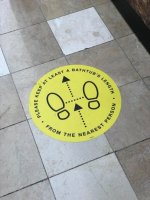I’m waiting for the Americans to weave the ‘football field’, a pretty common unit of measurement here in the US into musical nomenclature.
By the way I grew up in the UK and learnt quarter and eighth notes as crotchets and quavers, along with breves ( 8 quarter notes) semibreves (4 quarter notes) and minims (2 quarter notes). After that it just got silly

The trouble with calling them quarter notes is that as soon as you use a different time signature they don’t make sense!
Also, how come Americans don’t call them one fourth notes which seems a far more common term here than a quarter. When I ask for a quarter pound of something I get blank stares! Vive la difference eh!




